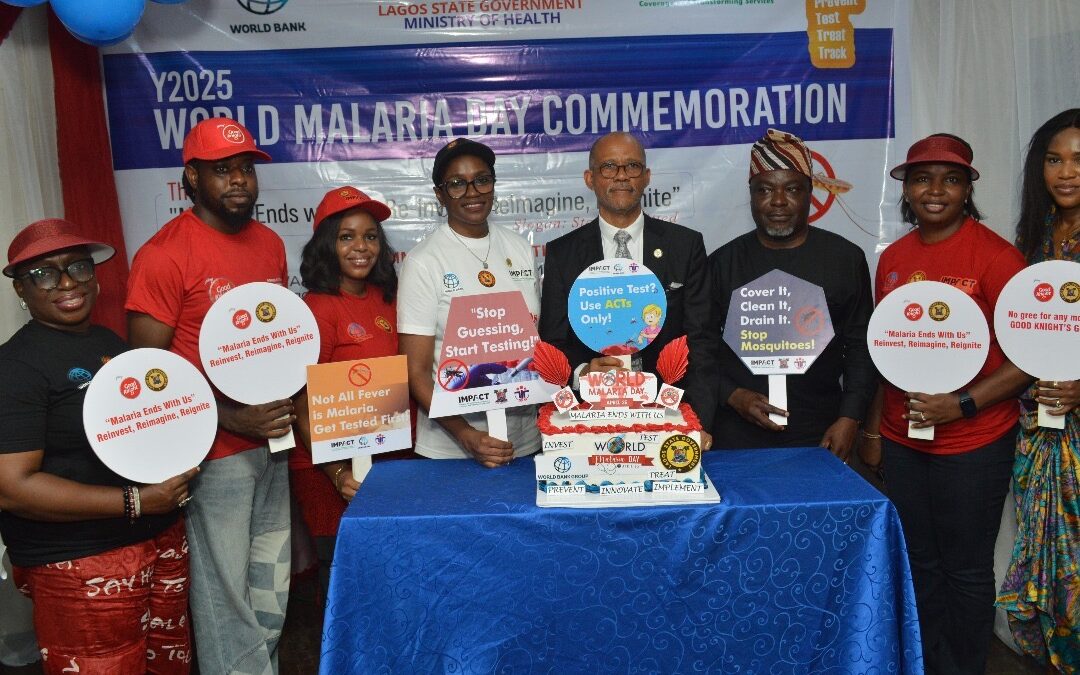Lagos State took a significant stride toward becoming Nigeria’s first malaria-free state during the Y2025 World Malaria Day celebrations, themed “Malaria Ends With Us: Reinvest, Reimagine, Reignite.” The Lagos State Ministry of Health, in partnership with the Society for Family Health (SFH) and Goodknight Nigeria, organized a vibrant awareness walk and stakeholder engagement in Alausa-Ikeja, galvanizing public and private sector support to drive the state’s malaria pre-elimination strategy.
The day began with a colorful procession of health workers, volunteers, and partners through the Lagos State Government Secretariat and Alausa community, distributing educational materials and promoting malaria prevention strategies. The event culminated in a high-level engagement at the Folarin Coker Staff Clinic’s Conference Hall, where Lagos State Commissioner for Health, Prof. Akin Abayomi, announced that Lagos has achieved a remarkable malaria prevalence rate of 1.3%, positioning the state on the cusp of pre-elimination status as defined by the World Health Organization (WHO).
“Lagos has transitioned from a 15% malaria prevalence in 2010 to 3% in 2023, and now, as of March-April 2025, we stand at an encouraging 1.3%,” Prof. Abayomi declared. “This is a historic milestone in our public health journey, and we are committed to pushing prevalence below 1% through digital innovation and partnerships.”
Governor Babajide Sanwo-Olu has mandated the Ministry of Health to lead Lagos into full malaria eradication, a directive Prof. Abayomi described as backed by “data, resources, and strong political will.” The state’s success builds on 15 years of adherence to the National Malaria Strategic Plan, with initiatives like the Pathway to Malaria Pre-Elimination and Digitization Programme, launched in March 2025, enhancing diagnostic accuracy and case management.
Prof. Abayomi emphasized the importance of testing before treatment, noting that over 50% of fever cases are still mistakenly treated as malaria despite only 1.3-3% testing positive. “Early detection and Artemisinin-based Combination Therapy (ACT) for confirmed cases are critical to preventing transmission,” he said, urging residents to use the Ilera Eko Health Insurance scheme for subsidized testing and treatment.
Dr. Kemi Ogunyemi, Special Adviser to the Governor on Health, highlighted the role of community engagement, stating, “The battle against malaria must be fought in our homes, schools, and markets.” She praised partners like SFH and Goodknight for their contributions to awareness and vector control.
Dr. Stanley Ugah of SFH reaffirmed their commitment to Lagos’s “Test Before Treatment” policy, while Goodknight Nigeria’s Brand Manager, Oluwatimilehin Dada, promoted their insecticide products as household solutions to combat mosquito bites. Dr. Simisola Alabi of Maisha Meds emphasized their digital health platform, which supports over 4,700 sites across Africa to standardize malaria diagnosis and treatment.
WHO’s Aisha Abdulkareem underscored global challenges like climate change and funding cuts, noting that 2.2 billion malaria cases and 12.7 million deaths have been averted in the last two decades. She called for renewed investment in proven interventions to sustain progress.
- The event concluded with a call for inter-sectoral collaboration and sustained investment in public health infrastructure. With Lagos’s malaria prevalence down to 1.3% and innovative strategies like digital surveillance and mandatory Rapid Diagnostic Testing (RDT), the state is poised to set a precedent for malaria elimination in Nigeria and beyond.
Related posts
Subscribe for newsletter
* You will receive the latest news and updates on your favorite celebrities!

